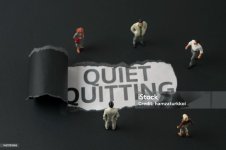Over the past few years, a new workplace buzzword has entered the chat surprisingly, and its none other than- Quiet Quitting. It doesn't mean employees are quitting their jobs literally. Instead, they are choosing to do only what's required, no late nights, no extra work, no " going the extra mile". Just meeting the expectations, not even trying to exceed them.
While some call this laziness or lack of ambition, others are calling it a bold act of setting boundaries and rejecting toxic hustle culture.
But here's the real question: Is this a sign of disengaged employees? or is it a wakeup call for the modern workplace?
Where It All Started
Quiet quitting gained traction post-pandemi8c, as burnout levels soared and work-life boundaries blurred. GenZ and millennials especially started questioning the 24x7 hustle that earlier generations normalized. People realized that their jobs were not their entire identity and working overtime for no recognition just...wasn't it anymore.
The Controversy
Managers argue that quiet quitting hurts productivity and morale. If an employee refuses to do anything beyond their job description, how will teams grow or handle challenges? On the flip side, employees argue they've already been doing so much over the years, even often unpaid, unnoticed and at the cost of their health.
So, is it laziness or finally putting mental health first?
A Sign of Broken Work Culture?
Quiet quitting might not be the problem, but a symptom of something deeper.:
Not Always Black & White
Let's be real- some people do the bare minimum just to get by. But for many, it's not about slacking off; it's about self-respect. Work should challenge and grow us, not drain us to the core. Boundaries aren't rebellion- they're a necessity for our own career growth.
And maybe the biggest irony? Employees who aren't "quiet quitting" might actually be practicing healthy professionalism- not disengagement.
Final Thoughts
Quiet quitting is making employees rethink leadership styles and workplace culture. Maybe it's not the death of ambition- but the birth and invention of a more balanced, honest approach to work.
So... Lazy trend ore employee Awakening?
What do YOU think?
While some call this laziness or lack of ambition, others are calling it a bold act of setting boundaries and rejecting toxic hustle culture.
But here's the real question: Is this a sign of disengaged employees? or is it a wakeup call for the modern workplace?
Where It All Started
Quiet quitting gained traction post-pandemi8c, as burnout levels soared and work-life boundaries blurred. GenZ and millennials especially started questioning the 24x7 hustle that earlier generations normalized. People realized that their jobs were not their entire identity and working overtime for no recognition just...wasn't it anymore.
The Controversy
Managers argue that quiet quitting hurts productivity and morale. If an employee refuses to do anything beyond their job description, how will teams grow or handle challenges? On the flip side, employees argue they've already been doing so much over the years, even often unpaid, unnoticed and at the cost of their health.
So, is it laziness or finally putting mental health first?
A Sign of Broken Work Culture?
Quiet quitting might not be the problem, but a symptom of something deeper.:
- Lack of recognition
- unrealistic expectations and workloads
- poor management
- no career growth
Not Always Black & White
Let's be real- some people do the bare minimum just to get by. But for many, it's not about slacking off; it's about self-respect. Work should challenge and grow us, not drain us to the core. Boundaries aren't rebellion- they're a necessity for our own career growth.
And maybe the biggest irony? Employees who aren't "quiet quitting" might actually be practicing healthy professionalism- not disengagement.
Final Thoughts
Quiet quitting is making employees rethink leadership styles and workplace culture. Maybe it's not the death of ambition- but the birth and invention of a more balanced, honest approach to work.
So... Lazy trend ore employee Awakening?
What do YOU think?

